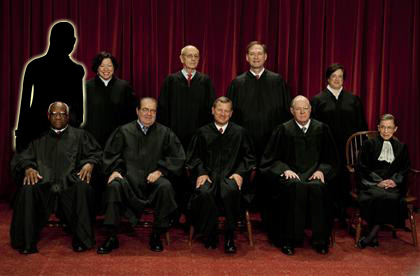
Competing against modern media, video games, sports, and cell phones, teachers have a difficult time keeping their students engaged in the classroom. With the recent economic downturn, most school districts are facing limited resources and severe cuts in school programs. In these challenging times, teachers need educational resources that are simple to use, effective, and free.
At the core of the Harlan Institute’s high school education program is an online interactive game, FantasySCOTUS--Fantasy Supreme Court of the United States. It is a Supreme Court fantasy league in which players predict current case outcomes, and is already a wild hit with law students, attorneys, and judicial chambers across the country.
The students learn about fundamental legal principles, make predictions about these cases, compete and collaborate with other classes nationwide, and write analytical blog posts about them. The site is free for all teachers and students to use, and can be used as a classroom exercise, or in extra-curricular clubs like debate teams or Junior Statesmen of America clubs.
Harlan selects cases of special interest to students. For each case, the Institute will provide teachers with lesson plans. Each plan will provide a plain English explanation of the parties involved, the question presented, the background of the case, the opinion of the lower court, and the competing arguments of the Petitioner and the Respondent. Following this background information, the lesson plan will discuss all relevant constitutional provisions, statutes, precedents, and other relevant information needed to understand the case pending before the Supreme Court.
In addition to the predictions, classes will also hone their writing skills in a fun and interactive medium: blogging. Each classroom will maintain a blog, and students will write posts about each of the cases, including their analysis of the precedents, their thoughts about oral arguments, and predictions for the holding. While the predictions will be graded automatically, Institute personnel will be responsible for grading and critiquing the blog posts according to a predetermined scoring rubric. In addition, we will offer an interactive chat room and forum, where teachers and students can interact with each other, and learn more about the cases.
Classes will compete against other classes in small leagues, based on geography. At the end of the Supreme Court term, the team with the best score in each league and their teacher will receive a to-be-determined prize.
What makes FantasySCOTUS so effective for pedagogical purposes is that it is real. These are real cases that the students will read in the news. Leveraging the immense popularity of fantasy sports among teenagers, FantasySCOTUS will transform following the Supreme Court from a routine review of old cases into an exciting game of predicting live cases. Factoring in the competition aspect, as students will compete with other classes across the Nation, this engaging and interactive platform will make the Supreme Court speak to the students unlike ever before.

